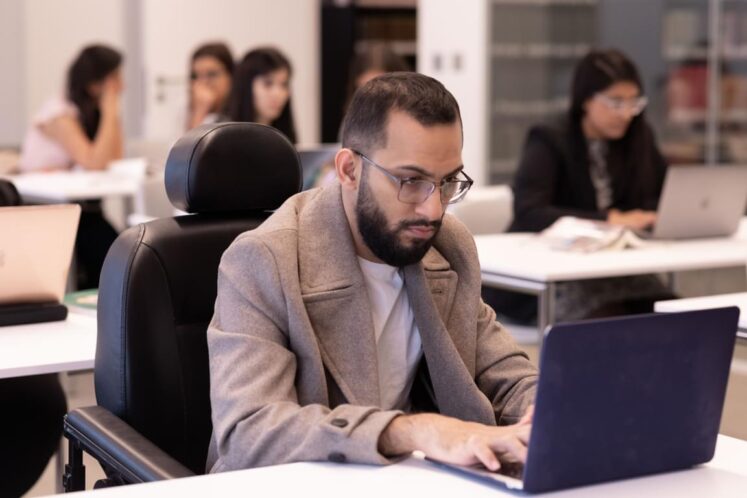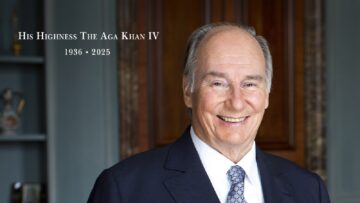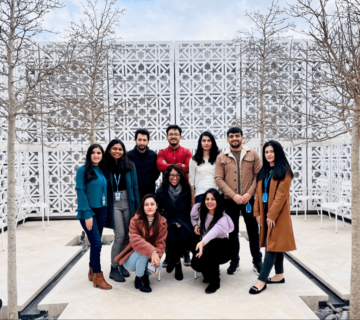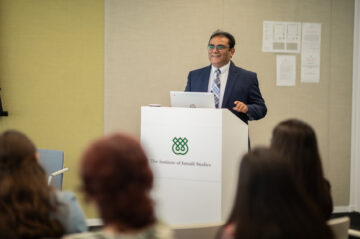Disability Pride Month takes place in July, with the aim to accept and honour uniqueness and to promote visibility and mainstream awareness of the positive pride felt by people with disabilities.
To celebrate Disability Pride Month this year, meet Uzair Ibrahim, a Farhad Daftary Doctoral Scholar in Arab and Islamic Studies at the University of Exeter and a former Research Assistant in our South Asian Studies Unit. His work focuses on Shi’i Islam, intellectual history and South Asian Studies, drawing from the fields of literature, history, and critical theory. He has a particular interest in the world of the jinn and how we make sense of that which we cannot see, a subject he believes he is drawn to because he has experienced the world from a different perspective from others.
Experiencing different cities
Uzair grew up in Karachi and came to the IIS in 2018 on the GPISH programme. He had previously spent a semester in Albuquerque, New Mexico as an undergraduate and found his move to the UK smooth, in part because he was comfortable with living independently having lived in the US.
“I found that getting around was much easier than I was used to. In Karachi and more broadly in Pakistan it can be inaccessible, so I have had to plan in minute detail where I wanted to go. In London these layers of forward planning are removed, though I sometimes turn up to the station and find a lift isn’t working. When that happens, there is information and staff to help so I can find another route.
“I also know I was lucky to be a student in accommodation in a part of town that has been recently renovated. Step free access can depend on the postcode you are in, but I also think that if you are born with a disability and live with it all your life, you figure out how to get around wherever you are in the world.”
Asked about managing bumps in the road, Uzair is sanguine: “Yes, there are times when you do everything you need to do to ensure access, but others can simply misunderstand. For example, I recently went to a summer school. I spoke with the hosts in advance, and they were very helpful. They asked the hotel to book a taxi from the airport with extra room for my chair, but when it arrived it was big but not accessible. So yes, there are frustrations.
“Every Friday I go to the Ismaili Centre across London to pray. I know the route I use is accessible. A few months ago, on my way back, one of the lifts at the station was broken – it was working just two hours before when I’d used it on my outbound journey. I had to take another train north and come back into the station on a different underground line to use a different lift.”
A different perspective
When it comes to his research, Uzair believes he has unique perspectives to offer: “My experiences are not the same as most people’s, even if we are experiencing the same thing, and this has been the way all my life. Even two people with disabilities will not have the same experience. Sometimes I can come up with solutions or ideas that others wouldn’t because I don’t have to think the same way they think. In that sense it has been a blessing because, in most cases, I’m not conditioned to think as other people are.
“Honestly, most people see life a certain way. A lot of scholarship looks at Islam in a certain way, and I know that it can be read in different ways. I like to think as creatively as possible.
“With my research on the jinn, I’m looking at things that cannot be seen. I’m not saying that I can see the unseen, but I have experience of looking at things that other people cannot or do not. In that sense I am well placed to think beyond the usual tropes of superstition and irrationality regarding how people interact with and make sense of the jinn.”
How society can be more supportive
We asked Uzair Ibrahim how we can be more supportive of people with disabilities, and he circles back to the uniqueness of individuals: “When I was born, one of the doctors told my mother, that though I might not be able to walk, apart from that I’m like anyone else. That stuck with my mother and it’s how I’ve gone through life. I went to a school with able bodied children, and to university too. I’ve lived in four countries (two of these because of GPISH) as a person with disability and absorbed aspects of different cultures. So in this sense I am a unique person to some extent, but in other ways I am like others, and I like to be treated as such.
“Some people try to help me with things I am comfortable doing on my own. I try to address this with people directly when it does happen and let them know I can ask for help if I need it.
“People tend to make assumptions. Often people are either excessively positive and think: ‘Oh wow, look at how well he’s doing’, or they can be excessively negative: ‘Oh poor him.’ But neither of these cases are people looking at me as an equal and if you can’t look at me as an equal then we can’t have a genuine relationship.”
This sums up Uzair’s approach to people. It’s appreciating their uniqueness that will help us work as a society to overcome misconceptions and prejudice. If we can take everyone as an individual and just listen. “This applies whether or not someone has a disability. I don’t want to advocate for an excessive individualism, but if we can create a society where everyone can live together, can listen to each other. That should not be too difficult to do.”







